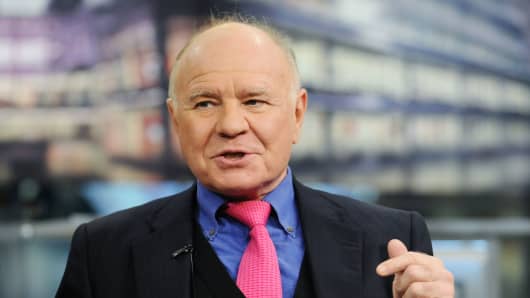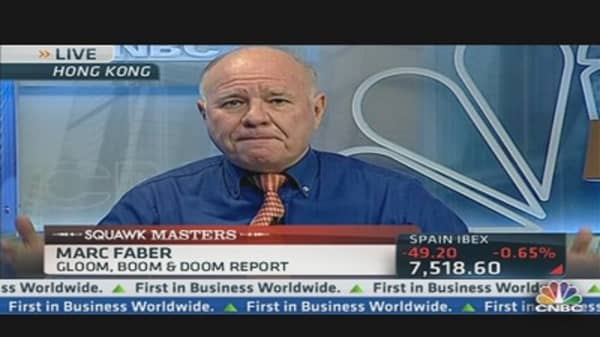The markets are going to go into meltdown soon, so expect stocks to lose 20 percent of their value, Marc Faber, author of the Gloom, Boom and Doom report told CNBC on Tuesday.
"I don't think markets are going down because of Greece, I don't think markets are going down because of the 'fiscal cliff' — because there won't be a 'fiscal cliff,' " Faber told CNBC's "Squawk Box.""The market is going down because corporate profits will begin to disappoint, the global economy will hardly grow next year or even contract, and that is the reason why stocks, from the highs of September of 1,470 on the S&P, will drop at least 20 percent, in my view."
Faber, who is known for his bearish views, cited tech giant Apple, a company whose disappointing earnings have caused its stock to fall 20 percent from its September highs and 14 percent in the past month.
A series of poor quarterly earnings from corporate giants such as Amazon.com, McDonald's and Google have hurt investor sentiment in recent weeks.
Faber argued that the "fiscal cliff," a rise in taxes and automatic spending cuts, would actually involve some minor tax increases in "five years' time" and some spending cuts "in 100 years."
What the U.S. needed was some pain, he said, aptly demonstrated by the euro zone's austerity measures that are attempting, with a mixed measure of success, to curb gaping budget deficits.
"There will be pain and there will be very substantial pain. The question is do we take less pain now through austerity or risk a complete collapse of society in five to 10 years' time?" he said, adding that there was a lack of political will to tackle the U.S. budget.
(Read More: Forget Mayans, Be Afraid of US Budget Armageddon)
Faber added: "In a democracy, they're not going to take the pain, they're going to kick down the problems and they're going to get bigger and bigger."
Payback Time
Faber identified several issues curbing an economic recovery, such as the real estate market, which he said had never been so "overbuilt." He also said there was lots more deleveraging ahead.
"In the Western world, including Japan, the problem we have is one of too much debt and that debt now will have to be somewhere, somehow repaid or it will slow down economic growth," Faber said. "I think we lived beyond our means from 1980 to 2007, and now it's payback period."
(Read More: Greece Needs Another 80 Billion Euros)
Faber told CNBC that central bank stimulus was useless and the implosion of markets was the only way to restructure the financial system.
"I think the whole global financial system will have to be reset and it won't be reset by central bankers but by imploding markets — either the currency [markets, debt market or stock markets," he said. "It will happen — it will happen one day and then we'll be lucky if we still have 50 percent of the asset values that we have today."
—By CNBC's Holly Ellyatt





